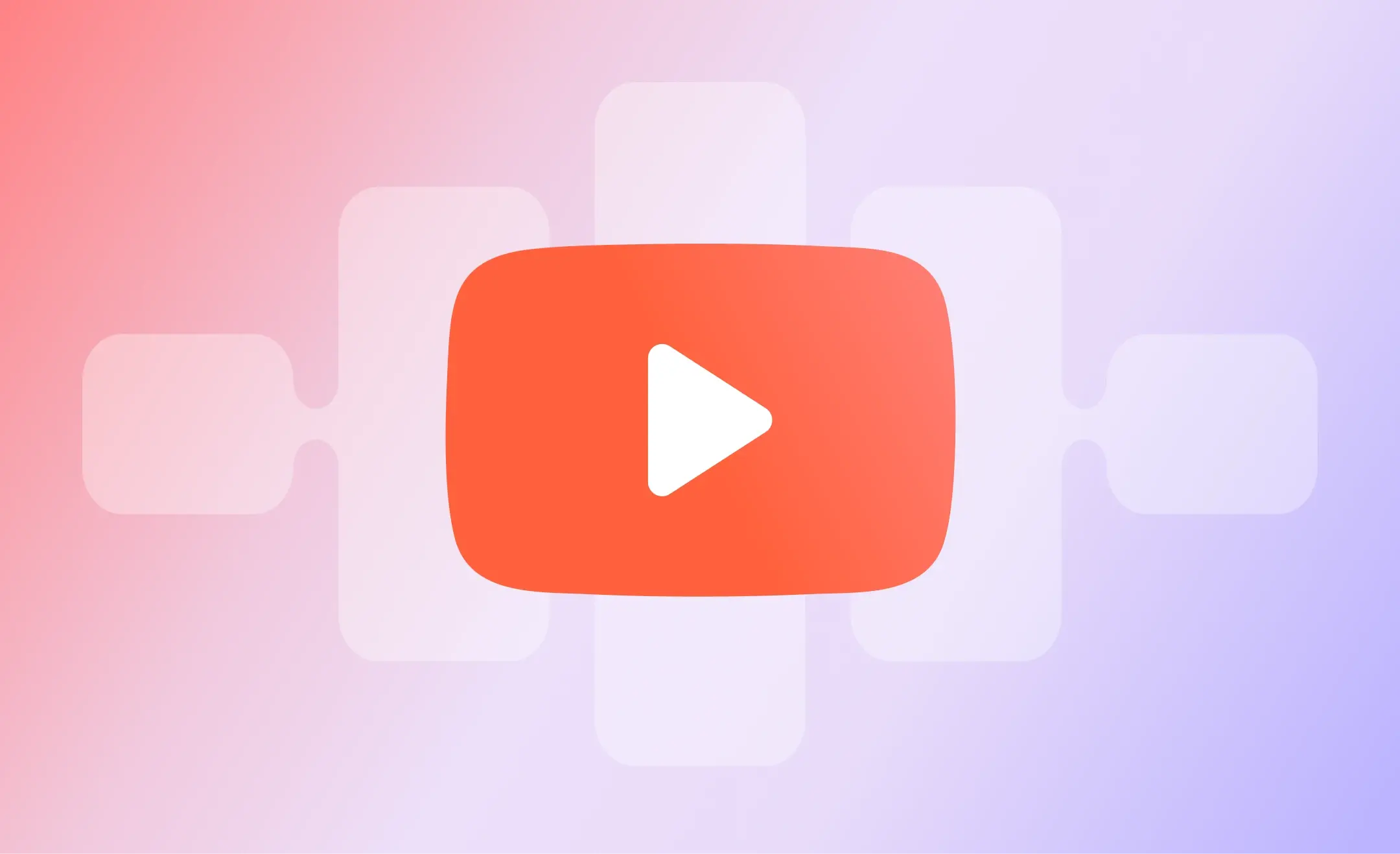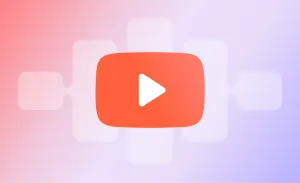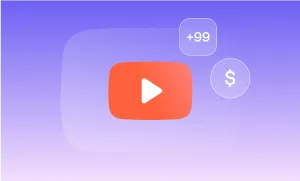Starting a YouTube channel is exciting, but it can also feel overwhelming with so many moving parts. From figuring out your niche to learning how to edit, upload, and actually grow an audience, the process is a mix of creativity and strategy.
The good news is that once you understand the basics and put the right systems in place, it becomes much easier to focus on what really matters: making great content.
And the even better news is that in this article, we’re about to show you everything! Here are some key takeaways before we dive in.
Key takeaways
- Define your niche and brand so viewers know what to expect from your channel.
- Plan your content strategy with themes, pillars, and batch ideas to avoid burnout.
- Invest in the essentials like clear audio, consistent lighting, and simple editing tools.
- Engage your audience by replying to comments, collaborating, and building community.
- Explore monetization options such as sponsorships, merch, or affiliate marketing once you’ve built momentum.
How to become a successful YouTuber: 10 steps you can't skip
1. How to find your niche on YouTube
The biggest misconception about finding a niche is that it’s a matter of picking one topic and sticking to it forever. In reality, most successful creators discover their niche by experimenting publicly.
Here’s a practical way to start:
- List your interests and strengths. Anything you’d feel comfortable teaching, entertaining with, or sharing stories about belongs here.
- Test formats quickly. Record a handful of short videos across different angles—tutorial, commentary, review, storytelling—and publish them.
- Watch for signals. Your niche isn’t just what excites you; it’s also what resonates with viewers. Which videos get longer watch times, comments, or shares?
Over time, a pattern will emerge. Your niche lives at the intersection of what you enjoy making and what your audience values. That balance is what gives your channel staying power.
2. Plan your YouTube content strategy
Think of YouTube as a long game. Viral videos are great, but consistent, sustainable growth comes from building a predictable rhythm for your audience. That’s where a content strategy matters.
Instead of creating videos one at a time, zoom out:
- Define your core themes. Choose 3–4 topics you’ll cover regularly to keep your channel focused.
- Map content pillars. For example, a tech channel might split videos into reviews, tutorials, opinion pieces, and behind-the-scenes.
- Batch plan. Outline at least a month of video ideas at once. This keeps you from scrambling every week and makes it easier to spot opportunities for series or playlists.
The most successful YouTubers don’t just think about the next video—they think about how the next ten videos connect to each other. That continuity builds binge-worthiness, which the algorithm loves.
3. YouTube equipment for beginners
Production value matters on YouTube, but not in the way most beginners think. You don’t need a studio setup right away. What you do need is equipment that makes recording simple and consistent.
- Start with your smartphone: Most modern phones already shoot in 1080p or 4K, which is more than enough for YouTube. Pair that with good natural light and your videos can look surprisingly polished. A window on a cloudy day, for example, creates soft and flattering light that can rival professional setups.
- Prioritize audio quality: If you are going to invest in one upgrade, start with sound. Viewers might accept slightly grainy footage, but poor audio drives them away fast. Even a simple USB microphone or clip-on mic can make your channel feel far more professional.
- Add simple upgrades over time: Once you’re comfortable recording, consider adding a tripod for stability and a ring light for flexibility when natural light isn’t available. Editing software is another step that allows you to refine your story and present your videos with more polish.
- Keep your setup realistic: The best gear is the gear you will actually use. A small, reliable kit that makes recording easy is always better than expensive equipment that never leaves the box.
4. How to start a YouTube channel
Launching a channel is more than filling out a form on YouTube. It’s like creating a foundation that shapes how people experience you and your content. The technical side is quick to set up, but the creative side deserves extra thought.
Create your Google account and channel
If you don’t already have one, start with a Google account. From there, set up your YouTube channel and add the basics: a profile picture and a banner. These are the first visuals your audience will notice, so keep them simple, clear, and reflective of your niche.
Choose a channel name
Pick something short, memorable, and aligned with the kind of content you want to make. A good name improves discoverability and gives your channel an identity viewers can quickly recall.
Set up your branding
Consistency builds recognition. Make sure your profile image, banner, and thumbnails share a visual style so your videos stand out in search results and recommendations.
Write your “About” section
This isn’t just a formality; it tells both YouTube’s algorithm and potential subscribers what your channel is about. Write in clear, friendly language, mention the type of content you’ll post, and link to your other platforms if relevant.
Record a channel trailer
Keep it short; around 30 seconds is enough. Introduce yourself, explain what kind of videos viewers can expect, and invite them to subscribe. This acts as your elevator pitch for first-time visitors.
5. How to create YouTube videos
Creating videos is the heart of your YouTube channel. It’s where your ideas, personality, and creativity come together. While the process can feel intimidating at first, breaking it into recording, editing, and uploading makes it manageable,
How to record a YouTube video
Start by setting up your space with good lighting and minimal background distractions. Make sure your microphone is close enough for clear audio, and test your camera angles before you start.
For beginners or experienced creators seeking efficiency, Podcastle’s recording studio is a game-changer. You can record high-quality video and audio directly in your browser, without complicated software. The interface is intuitive, and you can see yourself while recording, making it easier to stay on camera naturally.
How to edit a YouTube video
Editing is where your raw footage turns into a polished, watchable video. Cut unnecessary pauses, add captions, and include transitions or overlays to make the video more engaging. This is also the stage to refine your audio and correct lighting if needed.
Podcastle also offers a video editing platform, letting you trim clips, adjust sound levels, and add text or effects seamlessly. It’s designed to be beginner-friendly, so you can focus on storytelling instead of getting lost in complicated menus.
How to upload a video on YouTube
Once your video is polished, uploading is straightforward but important. Make sure your video file meets YouTube’s recommended formats and quality standards. While uploading, add a descriptive title, a clear thumbnail, and relevant tags to help viewers find your content. Don’t forget a compelling description and captions, if possible, as they improve both accessibility and search visibility.
After hitting publish, your work isn’t done. Share the video on your social media, engage with early viewers, and monitor analytics to see what resonates. Each upload teaches you something new, helping your channel grow step by step,
6. How to grow your YouTube channel
Yes, you could go viral overnight, maybe back in 2005, but it has become more and more of a myth nowadays. What’s really going to grow your YouTube channel is understanding your audience and creating a system that encourages them to return.
Consistency is important, but consistency paired with value is even better. Each upload should have a clear purpose. Engaging with viewers in the comments, responding to questions, and encouraging community interaction signals that your channel is active and fosters a loyal following.
Another way to boost your YouTube views is by collaborating with creators who share your audience. This way, you would introduce your content to viewers already interested in your niche.
It’s also important to learn how to let your content work for you. Study your analytics to see which videos generate longer watch times, higher retention, and more engagement. Use this information to refine your approach and double down on what resonates.
Organize videos into playlists, create series around popular topics, and experiment with formats strategically to keep viewers watching. Growth happens when the right combination of strategy, creativity, and audience understanding comes together consistently.
7. How to optimize YouTube videos
Optimizing your videos is what turns good content into discoverable content. Optimization combines strategy with creativity, from choosing the right keywords to designing thumbnails that capture attention, and writing descriptions that help both your audience and YouTube understand your content.
How to track keywords for YouTube
Keywords are the bridge between what people are searching for and the videos you create. Start by researching topics within your niche and identifying the terms your audience uses. Tools like TubeBuddy, VidIQ, or even YouTube’s search suggestions can highlight trending and relevant keywords. Once you know your keywords, naturally incorporate them into your video title, description, and tags, The goal is to align your content with what viewers are actively looking for without making it feel forced or repetitive,
How to make YouTube thumbnails
A thumbnail is the first impression of your video and often the deciding factor for a click. Thumbnails should be visually striking, easy to read even on small screens, and give a hint of what the video is about. Faces, bold text, and contrasting colors often perform well, but the key is consistency. A recognizable style across your thumbnails helps build your brand identity and encourages viewers to click on your videos instinctively.
YouTube descriptions and captions
Descriptions do more than summarize your video; they improve searchability and guide viewers to take action. Start with a concise, engaging first sentence, then expand with context, links, and relevant keywords. Captions and subtitles not only make your videos accessible but also improve engagement, as many viewers watch without sound. Accurate captions can also help YouTube’s algorithm understand your content better, boosting discoverability.
8. How to build your personal brand on YouTube
Your personal brand is what makes viewers remember you long after a video ends. It’s more than logos or colors; it’s the tone, perspective, and style you consistently bring to your content. Start by defining your voice. Are you educational, humorous, motivational, or a mix? The clearer your voice, the more memorable your channel becomes.
Visual identity also plays a role. From thumbnails to channel banners, maintain a cohesive style that reflects your personality and niche. But the most powerful part of branding is authenticity. Share your perspective, your quirks, and your story. Viewers are drawn to creators who feel real and relatable. Over time, this combination of consistency, style, and authenticity turns casual viewers into loyal fans, and loyal fans into advocates who naturally promote your channel.
Quick tips for personal branding
- Define a clear voice and tone
- Maintain a consistent visual style
- Share authentic stories
- Highlight unique strengths or expertise
- Engage in your niche outside YouTube
9. How to reply to comments on YouTube
Replying to comments is one of the easiest ways to grow your channel and build a community, but it’s often overlooked. Treat it as a conversation rather than a chore. The goal is to turn passive viewers into active participants who feel connected to you. Here’s how to do it effectively:
Top strategies for comment engagement
- Respond promptly to top comments to show your audience you’re active
- Write thoughtful replies rather than just saying “thanks”
- Answer questions and clarify points from your videos
- Highlight interesting viewer comments in your videos to encourage engagement
- Ask follow-up questions to spark discussion threads
- Keep a friendly and authentic tone to maintain a welcoming environment
- Use comments as inspiration for future content
10. How to Monetize on YouTube
Monetization on YouTube isn’t limited to ads, creators today have multiple revenue streams that can grow alongside their channel. Beyond views, it’s about building a brand that people trust and want to support.
YouTube affiliate marketing
Affiliate marketing is one of the fastest ways to start earning. By recommending products and services in your niche and adding affiliate links in your descriptions, you can generate commissions each time a viewer makes a purchase. The most effective affiliate strategies are tied directly to your content, like gear reviews, tutorials, or “top tools” videos, so the promotion feels like a natural fit.
How to make merch for YouTube
Merchandising lets you turn your community into a movement. From T-shirts and hoodies to mugs or stickers, branded products give fans something tangible to connect with. Print-on-demand platforms make it easy to launch without upfront costs, and designing around inside jokes, slogans, or visuals unique to your channel can make items feel exclusive and personal.
How to get sponsors on YouTube
Sponsorships can become one of the most lucrative revenue sources once your channel reaches a solid following. Brands are willing to pay for exposure to your audience, but relevance matters more than numbers. Smaller creators often secure sponsorships by showing high engagement and a well-defined niche. A good rule is to partner only with companies that align with your values and that your audience will genuinely care about, keeping trust at the center of your growth.
Tips on becoming a YouTuber
You don’t need a film degree or expensive gear to start your YouTube channel; you just need a willingness to experiment and a bit of patience. These tips will help you build a channel that feels authentic, engaging, and fun for both you and your audience.
1. Start before you feel ready
Most creators wait for the perfect camera, perfect lighting, or perfect idea, and never upload anything. The truth is, you’ll only figure out your style by making videos and putting them out there. Don’t worry if your first few uploads feel rough. That’s how every channel begins.
2. Pick a niche but leave room to explore
It helps to choose a theme or focus, whether it’s gaming, tutorials, fashion, or storytelling, because viewers will know what to expect. But don’t box yourself in so tightly that you can’t evolve. Many of the biggest creators today shifted their content over time, finding their sweet spot by experimenting.
3. Learn basic storytelling
Even a simple vlog feels more engaging when there’s a beginning, middle, and end. Ask yourself what journey you’re taking your viewer on in each video. A tiny narrative thread, even “I tried something new today and here’s how it went,” is enough to keep people watching.
4. Focus on connection over perfection
People subscribe to creators they connect with, not the ones with flawless editing. Talk to the camera as if you’re talking to a friend. Leave in some of the quirks, pauses, or laughs. That’s what makes a channel feel human and memorable.
5. Upload consistently but sustainably
The algorithm rewards consistency, but that doesn’t mean burning out. Set a realistic schedule you can actually maintain. One video a week is far better than five videos in a burst and then disappearing for a month.
6. Don’t obsess over the numbers in the beginning
Views, subscribers, and watch time will come with time. What matters most at first is improving with every upload. Celebrate the small wins, your first comment, your first subscriber, your first video that gets more views than usual. These moments are proof you’re building momentum.
7. Have fun with it
If you’re not enjoying the process, your audience will feel it. Try ideas that excite you, even if they don’t seem “perfect for growth.” Passion is contagious, and sometimes the video you made for fun ends up being the one that resonates most.
Become a YouTuber with Podcastle
Starting a YouTube channel is all about creativity, consistency, and the right tools to bring your ideas to life. While you focus on building your content and audience, Podcastle can help make the process smoother and more professional. Here’s how:
- AI-powered recording studio for professional-quality video and audio, right in your browser.
- Beginner-friendly Video Editor for trimming, adding captions, and polishing your uploads.
- Voice cloning and 1000+ AI voices to keep narration sharp and consistent.
- Royalty-free music and sound effects to set the tone and keep viewers engaged.
- Automatic transcription to boost accessibility, captions, and SEO.
Level up your YouTube journey today with Podcastle and keep your audience coming back for more.








